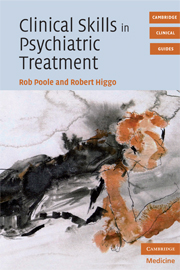Book contents
- Frontmatter
- Contents
- Acknowledgments
- Author biographies
- Introduction
- PART I UNDERLYING PRINCIPLES
- PART II THE CONTEXT AND LOCATION OF TREATMENT
- PART III PROBLEMS IN TREATMENT
- 11 Engagement
- 12 Compliance and concordance
- 13 Treatment resistance
- 14 Complicated problems
- 15 Managing risk
- 16 Staying well
- PART IV COPING
- Afterword: Optimism of the will and pessimism of the intellect
- References
- Index
13 - Treatment resistance
from PART III - PROBLEMS IN TREATMENT
Published online by Cambridge University Press: 08 August 2009
- Frontmatter
- Contents
- Acknowledgments
- Author biographies
- Introduction
- PART I UNDERLYING PRINCIPLES
- PART II THE CONTEXT AND LOCATION OF TREATMENT
- PART III PROBLEMS IN TREATMENT
- 11 Engagement
- 12 Compliance and concordance
- 13 Treatment resistance
- 14 Complicated problems
- 15 Managing risk
- 16 Staying well
- PART IV COPING
- Afterword: Optimism of the will and pessimism of the intellect
- References
- Index
Summary
Much of the work of psychiatrists involves trying to help people suffering from illnesses that prove to be resistant to ordinary treatment. When patients get better quickly and easily, they do not spend much time with clinicians, so dealing with the problems associated with treatment resistance is a major part of the work of mental health services.
These days there are evidence-based guidelines that set out rational paths of treatment progression in resistant (or refractory) disorders. They are helpful, particularly as it has become increasingly difficult for jobbing clinicians to keep abreast of a rapidly expanding evidence base. However, guidelines have limited application, because they can only ever take into account one of the three arms of the ‘triangle of forces’, namely the technical. They are based on research that, in order to be scientifically valid, excludes many of the complicating problems that are common in daily clinical practice. Applying research findings is often difficult because the constraints of research create gaps and differences with clinical practice. Consequently, the preparation of guidelines involves the use of expert opinion and a degree of interpretation in moving from evidence to guidance. Guidelines are helpful, but they cannot be relied upon to provide all the answers.
There is a significant difference between the clinical problem of treatment resistance and the research concept of treatment refractory or resistant disorders. In research, it is important to have tight definitions and homogenous groups of subjects.
- Type
- Chapter
- Information
- Clinical Skills in Psychiatric Treatment , pp. 134 - 148Publisher: Cambridge University PressPrint publication year: 2008

